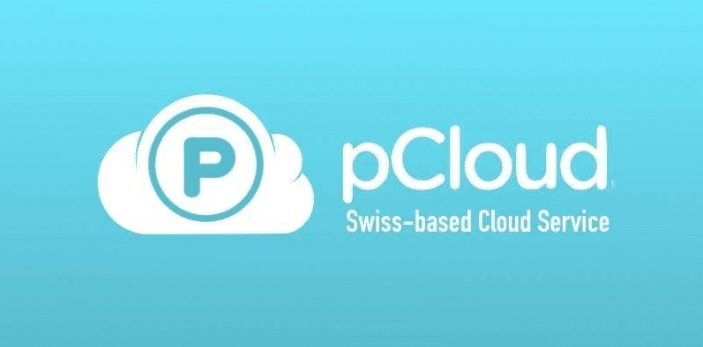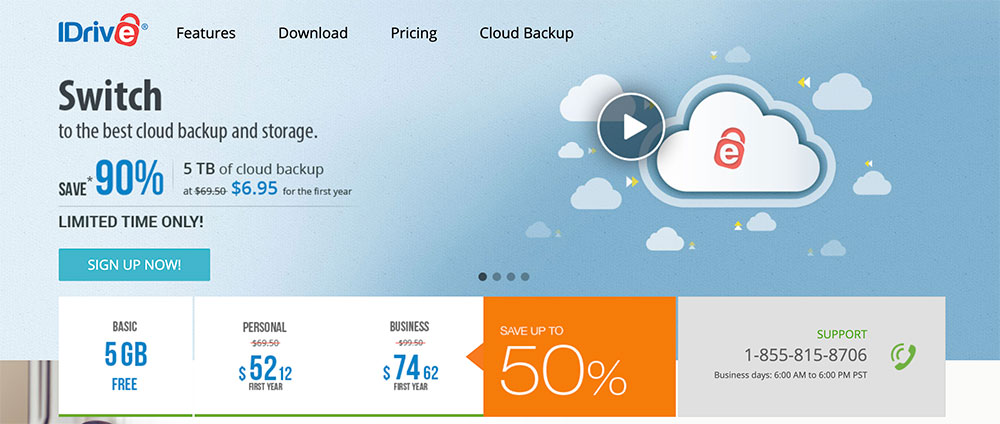As technology advances, so does the need for digital storage. The best cloud storage solutions are constantly having to advance and upgrade servers to keep up with demand. Both consumers and businesses are becoming more reliant on cloud storage and choosing cloud-based solutions rather than the hassle of local storage hardware.
In fact, Google data shows ever since Amazon launched it groundbreaking S3 cloud storage service 13 years ago, interest in cloud storage has increased by over 4,000 percent.
With cloud storage, or “online storage” as many now refer to it, all of your files are stored on secure servers located around the world. This is essentially the “the cloud.”
Over the past decade, the number of cloud storage service providers has grown right alongside the popularity of online storage, so it’s important to choose wisely.
Ultimately, the best cloud storage services offer the most bandwidth and storage while doing a solid job of keeping your data safe and secure.
If you’re wondering which is the best cloud storage, the following list has you covered. Most of the picks below offer a free plan to test their cloud storage solutions before handing over your hard-earned cash. Fast, secure, and super easy to use, iDrive leads the way. However, there are plenty of other worthy options worth considering.
Best Cloud Storage Solutions For 2021
1. pCloud
2. iDrive
3. Zoolz
4. Degoo
5. Mega
6. OneDrive
7. iCloud
8. Google Drive
9. Box
10. NextCloud
11. SpiderOak
1. pCloud

Excellent cloud provider for large files
Pros:
• Easy to use
• Simple and clean design
• Reasonably priced
Cons:
• Lacks collaboration tools
Based in Switzerland, pCloud is another top best cloud.storage option and a solid option if you’re looking for the best cloud storage unlimited. Why? Well, unlike other cloud storage providers, pCloud has no limits on file size. This makes it an ideal choice when it comes to storing large media files.
pCloud’s service covers all mobile and desktop platforms, and it offers a web-based login as well. Each pCloud plan comes with a minimum of 500GB of storage, 30 days of trash history, and unlimited remote upload traffic.
Unlike many others on this best cloud storage service providers list, pCloud offers monthly, annual, and lifetime subscriptions. Regardless of which plan you choose, you can pay an additional fee for pCloud’s Crypto feature, which allows you to encrypt individual files. This feature makes pCloud an ideal option for anyone searching for the best cloud storage encryption.
2. iDrive

Top-quality cloud storage with network drives
Pros:
• Fast
• Secure
• Easy to use
• iDrive Express backup option
Cons:
• No two-factor authentication
iDrive is arguably the best cloud storage for one reason: it also offers network drives. This means it’s able to cover everything from mobile devices to servers. With iDrive, you can share files via Facebook, Twitter, or email. You can also restore up to 30 prior versions of backup files.
On the topic of backups, iDrive also offers its own unique iDrive Express backup option. With iDrive Express, you can actually utilize a physical hard drive to quickly and painlessly backup all of your files and data. It even offers a disk image backup feature. Best of all, this service doesn’t delete cloud files automatically when deleting files on your hardware, so you don’t have to worry about completely erasing valuable data.
iDrive is also great for photo-minded users. In fact, it’s one of the best cloud storage for photographers. Thanks to iDrive’s facial recognition feature, all of your photos can be automatically organized and synced across all of your devices.
In addition to being one of the best cloud storage photos, iDrive is also one of the best cloud storage for business users. Its packages allow for unlimited users and offer server backups, single sign-on, priority support, and more.
3. Zoolz

An established cloud provider with a great reputation
Pros:
• Very affordable
• Hybrid backups
• File versioning
Cons:
• Lacks live backups
• No two-factor authentication
Whether you’re looking for the best cloud storage for personal use or the best cloud storage small business, there’s a lot to like about Zoolz. With a solid reputation in the cloud storage space, it offers an easy-to-use interface, a variety of web management options, and the versatility to combine cloud -based and external storage solutions.
Based in the UK, Zoolz uses the Amazon Glacier infrastructure to provide quality performance at a bargain price, making it one of the best values around. With more than three million users, if you’re wondering which is the best cloud storage, Zoolz deserves a spot near the top of the list.
4. Degoo

A popular newcomer with powerful features
Pros:
• Strong mobile apps
• Very popular
• Reasonably priced
Cons:
• Desktop utility could be improved
• Two-factor authentication only available via Google
Degoo isn’t a household name, but the Swedish outfit has managed to carve a niche for itself in the competitive cloud storage industry. With just two cloud storage packages to choose from, they’ve created a global userbase of 15 million, and with 20,000 people signing up for Degoo every day, they’ve clearly become a viable option for anyone looking for the best cloud storage online.
Degoo is also one of the few cloud providers utilizing file encryption. Unlike some cloud services, it also supports two-factor authentication via Google, making it a great choice for anyone searching for the best personal cloud storage 2020.
5. Mega
Impressive free plan and beefed up security
Pros:
• Excellent free plan
• Simple user interface
• Open-source syncing client
Cons:
• Lack of paid plan options
Finding a free plan with 50GB of storage is next to impossible, but you can stop your search because that’s exactly what Mega delivers. Add in a user-friendly drag-and-drop interface, mobile apps for convenient file and photo uploads, and desktop syncing clients, and you have one of today’s best cloud based storage solutions, let alone one of the best cloud storage deals.
Like several other top cloud storage service providers on this list, Mega also offers encrypted file storage. It even gives you complete control of the encryption key to prevent everyone, including Mega itself, from scanning your data and content.
With an open-source sync client for an extra layer of security as well, Mega is easily one of the best cloud storage free and paid solutions out there.
6. OneDrive
Perfect for Windows
Pros:
• Seamlessly built into Windows
• Restoration and file syncing
Cons:
• Minimal free storage
Microsoft OneDrive is an ideal cloud backup and storage option for Microsoft Windows users. Since the launch of Windows 10, OneDrive has been directly integrated into File Explorer, making it quicker and easier than ever to perform online backups.
There are also OneDrive mobile apps for Mac, iOS and Android users, so whether you’re looking for the best cloud storage for Android, iOS, or Mac, you can’t count Microsoft OneDrive out.
Plus, thanks to the OneDrive Photos app, you can sync images across each of your devices. You can also selectively sync image files stored on a hard drive, making OneDrive in some opinions the best cloud storage for photos as well. On the downside, there’s only 5GB of free storage.
7. iCloud

Surefire solution for iOS and Mac users
Pros:
• Designed to work flawlessly with Apple products
• Relatively inexpensive
Cons:
• Minimal free storage
Like OneDrive for Microsoft Windows, iCloud is Apple’s own version of a cloud storage locker offering 5GB of free online storage. While 5GB isn’t a lot of storage space, paid subscriptions with iCloud are competitively priced. Specifically designed for Apple users, if you’re wondering which is the best cloud storage for iOS and Mac devices, iCloud answers the bell.
So, what makes iCloud the best cloud storage for Mac and iPhone users? There are many reasons, but first and foremost, it’s easily accessible across all Apple platforms. With it, you can store virtually anything with the Mac Finder app, which is integrated with iCloud Drive. You can then sync your iWork documents across all of your devices, which are saved and stored in iCloud.
If you’re interested in the best cloud storage iPhone, iCloud has you covered here too. Not only can you easily access it from your iPhone or any other iOS device, but Windows users can also sync with iCloud Drive and access iWork apps via the iCloud website.
8. Google Drive

Smart, hassle-free storage solution for Google fans
Pros:
• Ideal for Google-minded users
• Full Android integration
• Variety of free and paid solutions
Cons:
• Interface needs some work
If you’re a G Suite or Android user in search of the best cloud storage home or business, then Google Drive is a natural choice. Google Drive is versatile and integrates seamlessly with Android devices and Google’s extensive suite of products.
With the ability to store mobile-based photos with Google Photos as well, it’s arguably the best cloud storage Android out there today.
Microsoft Windows and Mac users can benefit from Google Drive too. With intuitive drag-and-drop functionality, you can transfer and store files in just a few easy steps.
Google Drive is also one of the best cloud storage free options on the market. In fact, it offers 15GB of free online storage. Since other best cloud storage options typically only offer 5GB, this is a big deal. While the interface could use some work, all in all, Google Drive is arguably today’s best cloud storage value.
9. Box

Longstanding service geared towards business users
Pros:
• Business-oriented storage plans
• Focus on security
• App support
Cons:
• Extremely limited free cloud storage plan
By glancing at Box’s pricing page, it’s clear they’re geared towards businesses rather than consumers. As arguably the best cloud storage business, each of their business plans come with a free-two-week trial featuring unlimited storage, advanced collaboration options, and an emphasis on providing the best cloud storage security. Meanwhile, non-business users can utilize a free plan offering up to 10GB of storage.
As one of today’s best cloud storage options, Box also supports G-Suite, Office 365, and a variety of other apps. Plus, you can sync and view files from any device. With coverage for Windows, Mac, and Android clients, it’s a top-tier cloud storage service designed to benefit everyone, especially businesses.
10. NextCloud

Cloud storage “provider” for DIY users
Pros:
• Innovative
• Able to tailor to your needs
• Preconfigured setups available
Cons:
• Technically not a cloud storage provider
Technically speaking, NextCloud is not an online cloud storage provider on its own. Rather, the company is a self-hosted file sync & content collaboration platform that provides free software to install and administer cloud storage service on your own server yourself. The benefit of a self-hosted product is you get to keep your data on your servers, offering complete control while being faster in performance.
While this might seem intimidating for IT beginners or futile for serverless users, the service offers preconfigured hardware that runs NextCloud out of the box.
11. SpiderOak

‘Zero knowledge’ storage for privacy-minded users
Pros:
• Strong security
• Custom clients for all major platforms
Cons:
• Limited free offering
Zero knowledge cloud storage pertains to the encryption process, which according to SpiderOak, takes place before syncing so the service has no idea of what you’re storing with them. You are the only one who knows what’s being encrypted and stored, which makes your data utterly private. The source code of the client isn’t public though, so you’ll just have to take SpiderOak’s word for it.
While we’re at the subject of clients, there is native support for Windows, Mac, Linux, Android, and iOS, although the mobile apps are read-only and don’t allow you to upload your mobile files.
Best free cloud storage in 2021
• Google Drive
• pCloud
• Microsoft OneDrive
• Dropbox
• MediaFire
1. Google Drive
Beefy cloud storage coupled with online office tools
Pros:
• 15GB of space for free
• Full access to G Suite
• Backup and Sync desktop app
Cons:
• Clunky interface
At 15GB to peruse at zero cost, Google Drive is one of the more giving cloud providers, with the option of additional 2GB of free storage if you perform Security Checkup. Do note that all of your files from other Google services (Gmail, Photos, etc.) are also stored here, meaning each email attachment you download takes space.
However, a Gmail address isn’t mandatory to sign up for Google Drive. Create a new Google account and you’re good to go, but don’t be confused if you see Google One – a rebranding of paid Google Drive storage that’s not yet available everywhere.
As for the current service, there are mobile apps for Android and iOS users, Google’s own office productivity tools, and a nifty Backup and Sync desktop app that enables you to automatically duplicate your files in the cloud, just in case your laptop or PC dies or gets pinched.
2. pCloud
Smooth-running, user-friendly service
Pros:
• Elegant and intuitive interface
• Simplified sharing options
• Users can double the free storage
Cons:
• Not ideal for collaborations
The free pCloud version starts with 10GB of file space, which can then be upped to 20GB through a combination of completed offers (4GB) and referrals (1GB each). As a bonus, there’s a 50GB of downlink traffic bandwidth allowance on a monthly basis.
The appealing and highly functional interface makes storing files easy, whether it’s through finely crafted desktop and mobile apps or pCloud’s website. File sharing features are as simple as they can be, with the ability to share files with non-pCloud users. Built-in streaming features and no restriction on file size means you can freely send large files such as HD video to your friends or coworkers.
Although the focus here is on the free offering, pCloud also offers appreciable deals for upgrading to a paid service. 500GB storage will cost you $3.99 per month, while there are also a couple of affordable annual and lifetime subscriptions if you’re looking to save some money.
3. OneDrive
Stellar storage solution aimed at Windows users
Pros:
• Excellent integration with Microsoft products
• Documents can be edited online without download
Cons:
• Only 5GB of free storage
One would expect that a tech giant like Microsoft would offer more space for free users to store files but that’s not the case – you will have to make do with 5GB of storage. Granted, the basic paid plan offers 50GB for a fair price, and Office 365 subscribers get 1TB of space for their trouble.
Therein lies OneDrive’s biggest appeal – much like it’s Google counterpart, the service will primarily find a home with Microsoft users, thanks to its close relationship with MS Office apps and automatic Windows 10 integration. For users on the go, there are mobile apps that allow easy cross-platform use.
OneDrive makes collaboration easy as it doesn’t limit the use to OneDrive users only, and you can even customize access and how you share files with others. Remote storage of documents also included the ability to work on files online without downloading them, which certainly simplifies things.
4. Dropbox
Popular cloud storage provider with broad third-party support
Pros:
• Wide array of supported platforms
• Lots of useful features
Cons:
• Measly 2GB allowance
Let’s get to the bad news first. For such a respected service, Dropbox doesn’t do itself any favors with only 2GB of free storage allowance, one of the least generous freebies around. However, there are multiple ways to rake up additional space that include completing the starting guide (250 MB), referring family, friend, or colleagues to the service (500MB per referral, up to 16GB), and contributing to the Dropbox Community forum (1GB).
Once you get past that initial drawback, Dropbox reveals some crafty tricks.
For instance, Dropbox Paper is a collaborative tool that allows seamless sharing files between different users and syncs your photos to cloud automatically via the desktop app. You can also request users to upload directly to your Dropbox account with the File Requests feature, and edit files without downloading them first when working through the web version.
The service also exhibits serious flexibility with a bundle of desktop and mobile apps that include all the regulars and some uncommon platforms like Linux and Kindle. This allows access to your storage platform from virtually any device, accompanied by a wide range of supported third-party apps and services.
5. MediaFire
Highly capable cloud-based storage solution
Pros:
• Up to 50GB of free space
• Excellent interface and sharing options
Cons:
• Ad-filled free account
MediaFire starts you off with 10GB of free space, which you can then increase fivefold through various usual activities such as referring other people of following the company across the social media landscape. You’ll end up with 50GB of free cloud storage space, but do note that you’ll have to suffer through advertisements – arguably a small price to pay.
The service has been in the business for a long time and it had plenty of time to work out some kinks, such as speed and overall ease to manage files, even with non-users. MediaFire supports files up to 4GB large, with no limit of downloads.
Apart from the impressive web version, the service is available for Android and iOS users through apps that work well and have a few practical features on their own like the automatic photo and video syncing and streaming options.
Further reading: Best Free Cloud Storage Solutions
Best Business Cloud Storage
• SpiderOak
• Tresorit
• Egnyte
• Dropbox Business
• Box for Business
1. SpiderOak
High security combined with a simple interface
Pros:
• Top-notch security
• Central device management
Cons:
• Not as collaborative-friendly as other services
Founded in 2007, SpiderOak is a collaboration tool, online backup and file hosting service that leverages a cloud-based server to allow its users to access, synchronize and share data.
Not only does it boast with high-level data security and privacy as its key feature, but it also provides cloud storage, online backup and sharing service using a ‘zero knowledge’ privacy environment (at least the company claims so). Under such conditions, your data is end-to-end encrypted and hidden from everyone without permission, including SpiderOak. You are the only one permitted to view all stored data.
Considering the focus is on security and privacy, SpiderOak didn’t waste much energy on intricate design. The interface is pretty simple and straightforward, with a convenient drag and drop feature that helps you organize files in a quick and efficient manner.
The centralized device management dashboard grants users easy access to settings for all applications such as sharing and backup selection, allowing them to manage their accounts, set group permissions and monitor usage.
If you are looking to see for yourself what the service is all about, you will need to contact SpiderOak’s Sales Team for a quote. Do note that a minimum of 500 users is required to qualify, and per online community, SpiderOak lacks many of the collaboration tools that can be found with other cloud storage providers.
2. Tresorit
Superior file encryption through stylish apps
Pros:
• 14-day free trial
• Strong end-to-end encryption
• Multiple packages available
Cons:
• Not the best for personal use
Hailing from Hungary and Switzerland, Tresorit is a cloud storage provider with a focus on increased security and strong data encryption for businesses, but also personal users.
The provider will primarily entice businesses whose main priority is keeping stored data safe online as Tresorit offers cloud service with its ‘zero-knowledge’ encryption. This means that only the people you choose can have access to your data. Moreover, its two-factor authentication login provides an additional layer of security for your account.
Let’s talks pricing: the ‘Small Business’ plan costs $23 (€20 or £17.5) per month (or $18 monthly for the annual plan) for teams with 2-9 users. You get 1000GB of encrypted storage, synching of existing folder structure, as well as secure access for up to 10 devices.
The ‘Business’ plan comes with a price tag that starts at $28 (€25) monthly (or $23 per month if you select the annual plan). This package includes bonuses such as digital rights management, remote wipe and help via phone. At the moment of writing, the ‘Business’ plan is up for grabs at a 50% discount, which means it could be yours for as low as $14 per month. This plan is intended for organizations counting 10 people and more.
The ‘Enterprise’ option will cost you $35 month (or $28 should you choose the annual plan) and is perfect for business with more than 100 users. Additional features include admin API, personalized staff training and on-premises deployment. If you decide on this option, you will need to contact the Tresorit team directly in order to sign up.
All Tresorit’s pricing packages are accompanied by a 14-day free trial. That being said, Tresorit might be considered a bit pricey. However, keep in mind that it offers a higher scale of security compared to other similar services out there as well as additional features, so it is probably worth it.
3. Egnyte
Plenty of storage accompanied by flexible sync tools
Pros:
• 15-day free trial
• Superb integration
Cons:
• Occasional loading problems
Established in 2007, Egnyte provides quality software for enterprise’s every file synchronization and sharing need. With Egnyte, businesses can stow any type of data in the cloud both locally and online, whereas more sensitive data can be kept on on-premise servers for additional security.
The company’s content services platform has a user-friendly collaboration system that allows business teams to work wherever and in whichever way they want. The service is fully-integrative with widely used industry applications like Outlook and Office 365, providing both internal and remote employees with access to important files.
As for pricing, the ‘Office’ plan, aimed at groups of 5-25 employees, begins at $8 (£6.12) per employee per month and offers 5TB storage for files up to 10GB.
Egnyte’s ‘Business’ option kicks off at $15 (£11.50) per employee on a monthly basis, covers 25-100 employees, 10TB online storage and files no larger than 10GB.
The ‘Enterprise’ plan is intended for enterprises that have more than 100 employees and it will get you unlimited storage for files up to 25GB in size. Signing up, as well as asking about the price for this option, will require that you contact the company directly.
All Egnyte’s packages come with a 15-day free trial, with online critics having some concerns over long loading time for some files, such as photographs.
4. Dropbox Business
Affordable and dependable storage from the industry heavyweight
Pros:
• Simple to use
• 30-day free trial
Cons:
• No online editing tools
More than 11 years of experience makes Dropbox one of the oldest and most reliable options for businesses when it comes to cloud storage.
What characterizes Dropbox and makes it such a popular choice is the ease of use. There are no compatibility issues with different file types, and cross-platform functionality across most devices and apps, along with the drag and drop action for the desktop app, makes this one of the easiest services to use.
Users can freely share content with others via links, even if the person in question is not a Dropbox user. The business iteration of the service allows you to connect your personal account in order to have all your files in one place, with its automatic camera upload feature recently made available for business users.
Administrators can gain insights into the status of each team member from the dashboard, as well as modify how they share and manage files, set access permissions, and monitor usage.
Third-party support is on a high level, with apps such as Microsoft Office and Slack part of the package.
Speaking of packages, Dropbox Business offers three different tiers. The ‘Standard’ plan will cost you $12.50 (£9.71) per user per month starting at 3 users and includes 3 TB of space for secure storage, 120 days of file recovery, two-factor authentication, and a whole lot of features.
The ‘Advanced’ package builds up the ‘Standard’ plan and starts at $20 (£15.70) per user per month with unlimited storage and advanced admin controls and user management tools.
To subscribe to the ‘Enterprise’ tier, it’s necessary to contact Dropbox directly and work out a deal.
There is a 30-day free trial for which you will have to provide your payment credentials, after which you’ll be automatically bumped up to a paid plan and charged. One consistent complaint from users what the absence of online editing tools.
5. Box for Business
Low-cost and solid storage from a reliable provider
Pros:
• Intuitive interface
• Inexpensive
Cons:
• Read-only sharing
With almost a decade and a half under its belt, Box is a mainstay in the cloud content management and file sharing scene.
Box’s strong points are broad management abilities and an emphasis on security. The UI is made to feel you at home right from the start and is quite easy to navigate. Access to settings, files, and folders is regulated through the user dashboard, where admins can keep an eye on all users, track activity and manage sharing options.
Users can access their files through the Box Sync client, which is available for Mac and Windows, and also from the Android client. The service is supported by a variety of commonly used apps that include Google Docs and Office 365, to name a few.
Price-wise, ‘Starter’ plan is the entry package starting at $5 (£3.88) per user/month. This gets you 100GB secure storage, 2GB file upload with a maximum of 10 users (minimum is three users for all plans).
The ‘Business’ plan starts at $15 (£11.80) per user/month and incorporates unlimited storage in the mix, 5GB file upload, advanced security, customisation and reporting, and no limit on the maximum number of users.
There is also ‘Business Plus’ package that costs $25 (£19.60) per user/month and features unlimited storage, 5GB file upload, advanced admin controls and capabilities, as well as limitless external collaborators.
As is the custom, the top tier plan – ‘Enterprise’ – requires you to contact Box directly for a quote.
Box offers a 14-day free trial for all packages, with one common complaint that the service is missing online editing functionality for external users, thus access to read-only.
Jamie Spencer
Latest posts by Jamie Spencer (see all)
- How to Start a Successful Cryptocurrency Website - September 12, 2024
- 50+ Ways To Advertise Your Business For Free On The Internet – 2024 Guide - September 5, 2024
- The Fastest WordPress Hosting Providers 2024 – If You’re Not Fast…You’re Last!!! - July 8, 2024
